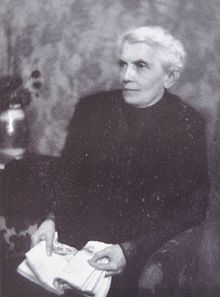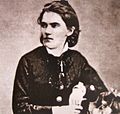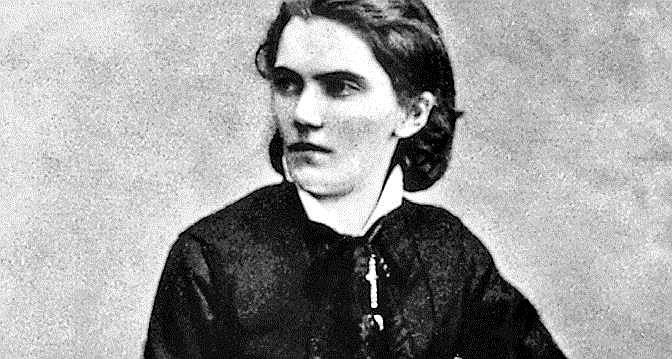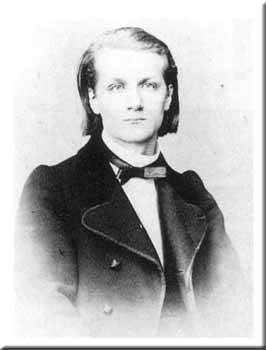Meta von Salis
Barbara Margaretha von Salis - Marschlins (* March 1, 1855 at Schloss Marschlins in Igis, † March 29, 1929 in Basel), better known as Meta von Salis, was not only the first historian of Switzerland, but also one of the most well-known women's rights and a campaigner for women's suffrage. In addition, she was a passionate philosopher and friend of Friedrich Nietzsche and letter to his sister Elisabeth Förster - Nietzsche.
Life and work
Meta von Salis comes from the old Grison noble family of von Salis and grew up in her parents' castle Marschlins. According to the conservative ideals of education, she attended her father's typical Mädchenpensionate. After her education in what it termed " housewives - breeding establishments " they taught himself further and decided as a young woman to become governess, at that time one of the few employment opportunities for women from the upper class. Beginning in 1883, she studied first woman in Switzerland at the University of Zurich history, philosophy and art history. In 1887 she received her doctorate with a dissertation on Agnes of Poitou, and thus became the first " woman doctor " of the Canton of Grisons. She then worked as a freelance journalist and publicist.
As a women's rights activist attention to themselves, they first made in 1886 with the lyrical pamphlet The future of women. More attention was an article in the liberal daily newspaper in Zurich post from 1 January 1887 under the title New Year heretical thoughts of a woman called them there, for the first time in German-speaking Switzerland, the political voice and suffrage for women. Known she was also her work as a speaker lecture, including a lecture series of 1894, entitled women to vote and the election of women. Your final sentence was:
"As long as the man does not recognize the equality of women in the state, their consent is not a fact, it remains abandoned all coincidences of fate. Either equal laws, equal rights, equal responsibilities and penalties, impartial judge, or the moral and physical decline of the human race takes its inexorable progress! "
In addition to the political equality called Meta von Salis, is the legal equality for women. She criticized the fact that the woman was not recognized in Swiss law as a mature person, but nevertheless as such could be convicted in court. Even in literature, she sat down in poems and novels with the discrimination of women apart, as in the novels The Guardian Angel (1889 ) and Fearless and faithful (1891 ).
Big attention was their journalistic agitation for the Zurich physician and suffragist Caroline Farner, who was sentenced in 1892 for embezzlement. Their legal rehabilitation she was able indeed to fight, but it was even involved in the connection from the inferior judge in a Ehrverletzungsprozess and 1894 to a - sentenced prison sentence - if rather symbolic. After this setback, she pulled more back into private life. In 1904 she migrated with her partner Kym Hedwig out to Capri and also lived after their marriage to Ernst fig winter in 1910 until her death in Basel with her in the same household together. Hedwig Kym's marriage, which came as a surprise to everyone you know, Meta von Salis was very irritated. Prior to her relationship with Hedwig Kym (1860-1949) Meta von Salis entertained for years a love relationship with Theo ( phanie ) Schücking ( 1850-1903 ), which ended abruptly because this was claimed by her father Levin Schücking for its own plans, while up the daughter had tried in vain to rebel.
Meta von Salis Friedrich Nietzsche had in 1884 met in person and showed up after his spiritual death as a generous patron of the Nietzsche Archive. So she bought in 1897 for her friend Elisabeth Förster - Nietzsche, Villa Silberblick in Weimar, which served as the seat of the archive. Due to unauthorized modification measures Förster Nietzsche on building the two women quarreled however, and von Salis sold the house to the Nietzsche - relatives Adalbert Oehler, from which it was able to buy himself later Förster-Nietzsche. As an admirer of Nietzsche's published Meta von Salis in 1897 addition, the successful book Philosophy and precious person about their encounters with the philosopher.
Meta von Salis was a pronounced individualist; the contemporary women's movement they distrusted more. Except in the case of women's rights, she represented in all other social policy issues decidedly conservative and aristocratic views. She has published in the 1920s regularly in the Swiss Monatshefte for politics and culture. After losing dispute of 1894, they turned away from the struggle for women's rights and was interested now more for the racial theories of Gobineau, Arthur de. Encouraged, she was in her German - national consciousness by reading the letters of Henry of Treitschke.In her later writings she was influenced by German nationalist and racist ideas.
Publications (selection)
- Poems. Schmidt, Zurich 1881.
- The future of women. Buchholz & Werner, Zurich / Munich 1886.
- Agnes of Poitou, Empress of Germany. A historical- critical- psychological treatise. Zurich 1887 ( Dissertation, University of Zurich, 1887).
- The guardian angel. Merhoff, Munich 1889 (novel).
- Fearless and true. Merhoff, Munich 1891 (novel).
- The process Farner Pfrunder in Zurich. The documents before and after the life communicated. Eastern Switzerland, St. Gallen 1893.
- For communication: An experiment. Rischmüller & Meyn, Munich 1894.
- Philosopher and precious human being. A contribution to the characteristic of Friedrich Nietzsche. Naumann, Leipzig 1897; Scientific Publishing, Schutter Forest / Baden 2000.
- Chosen women of our time. 2 vols. Self-published, Marschlins / Basel 1900/1909.
- Aristokratika. Arnold Bopp, Zurich 1902.
- Aristokratika II Arnold Bopp, Zurich 1909.
- Gemma: Memories of Baroness Emma by Wöhrmann. Basel 1918.
- Memories. Self- Verlag, Basel [ 1916-1919 ].








